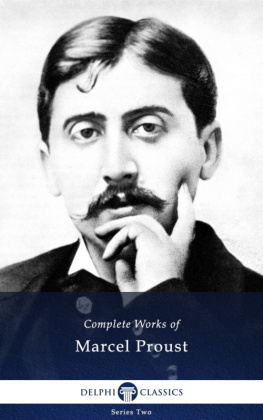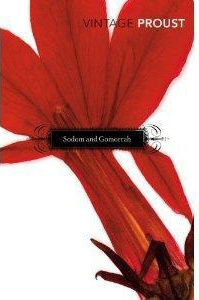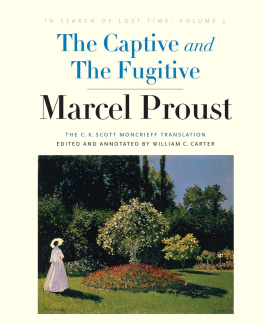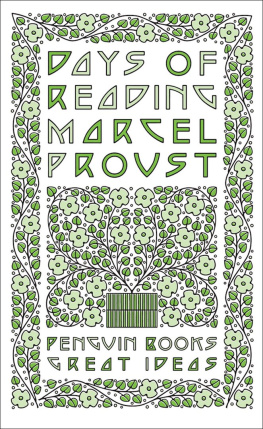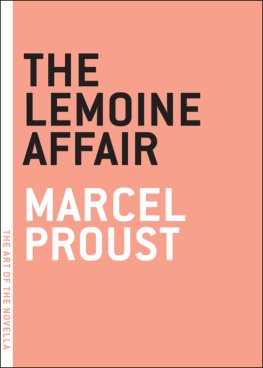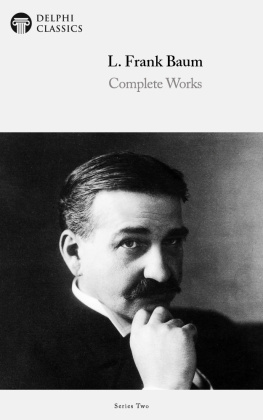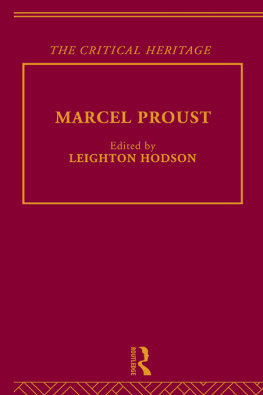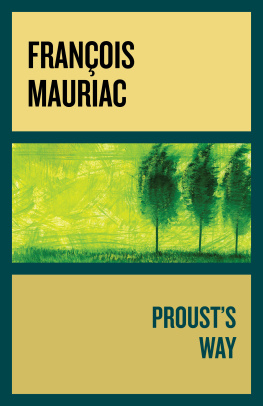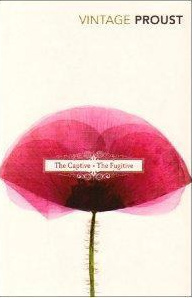
The Complete Works of
MARCEL PROUST
(1871 1922)

Contents

Delphi Classics 2014
Version 2

The Complete Works of
MARCEL PROUST

By Delphi Classics, 2014
Remembrance of Things Past

Prousts birthplace, Paris

Prousts birth certificate

Proust as a child
REMEMBRANCE OF THINGS PAST
la recherche du temps perdu
This is the title of Prousts landmark novel, which is comprised of seven volumes. la recherche du temps perdu is famously known for the concept of involuntary memory and the novels considerable length. The entire narrative contains nearly 1.5 million words and is classed as one of the longest novels in world literature.
Proust began writing the novel in 1909 and continued working on it until his final illness and death in the autumn of 1922. The structure was established early on, and the novel is complete as a work of art and termed by some critics as a literary cosmos. Proust kept adding new material through his final years, while editing one volume after another for print. The final three volumes contain oversights and fragmentary or unpolished passages which existed in draft at the death of the author; the publication of these parts was overseen by his brother Robert.
The various volumes were published in France from 1913 to 1927. Proust paid for the publication of the first volume, by the Grasset publishing house, after it had been turned down by leading editors, who criticised the manuscripts longhand state. Many of the novels ideas, motifs and scenes appear in adumbrated form in Prousts unfinished novel, Jean Santeuil (189699), though the perspective and treatment there are different, and in his unfinished hybrid of philosophical essay and story, Contre Sainte-Beuve (190809).
The questions raised by homosexuality are pervasive throughout the novel, particularly in the later volumes. The first arrival of this theme comes already in the Combray section of Swanns Way, where the daughter of the piano teacher and composer Vinteuil is seduced and perverted, and Marcel observes her having lesbian relations in front of the portrait of her recently deceased father.
There is much debate as to how great a bearing Prousts sexuality has on understanding these aspects of the novel. Although many of Prousts close family and friends suspected that he was homosexual, Proust never admitted this. It was only after his death that Andr Gide, in his publication of correspondence with Proust, made public Prousts homosexuality. The nature of Prousts intimate relations with such individuals as Alfred Agostinelli and Reynaldo Hahn are well documented, though Proust was not out and proud, except perhaps in close knit social circles.
la recherche du temps is considered the definitive modern masterpiece by many scholars, having a profound effect on subsequent writers such as Virginia Woolf, Evelyn Waugh and James Joyce. Literary critic Harold Bloom wrote that the novel is now widely recognised as the major novel of the twentieth century.
ABOUT THE TRANSLATOR

Charles K. Scott Moncrieff (18891930) was a Scottish writer, most famous for his almost complete translation of Prousts la recherche du temps perdu , which he published under the Shakespearean title Remembrance of Things Past . The English title is taken from the second line of Shakespeares Sonnet 30:
When to the sessions of sweet silent thought
I summon up remembrance of things past...
Scott Moncrieff published the first volume in 1922 and continued translating until his death in 1930, at which time he was working on the novels final volume. In a letter written on his deathbed in 1922, Proust congratulated Scott Moncrieff on his remarkable translation.
Like Proust, Scott Moncrieff was rumoured to be a homosexual and some biographers believe he had a sexual relationship with Wilfred Owen, the posthumously famous war poet. These rumours caused fellow poet Robert Graves to sever all ties with both men, though many historians believe Scott Moncrieffs love for Owen was unrequited. After Owens death in one of the last and most pointless battles of World War I, some of their friends blamed Scott Moncrieff for not finding Owen a safer posting.
Scott Moncrieff died twelve years later of Cancer, while staying in Rome. His translation of Prousts novel remained the standard English version for several decades, receiving critical praise from many admirers, to the extent that the Translators Association offers an annual award titled the Scott Moncrieff Prize for French Translation.

Marcel Proust by Jacques-Emile Blanche, 1892

The building (now a bank) where Proust finished writing the novel in seclusion

A complete edition, 1946

A still from the 2011 television adaptation

The photograph that shocked Prousts mother: Marcel Proust, with Robert de Flers (left) and Lucien Daudet (right), 1894
SWANNS WAY

Translated by C. K. Scott Moncrieff
Originally rejected by a number of publishers, including Fasquelle, Ollendorf, and the Nouvelle Revue Franaise (NRF), the first volume was finally published in 1913. Proust had eventually arranged with the publisher Grasset to pay the cost of publication himself. When published it was advertised as the first of a three-volume novel.
Du ct de chez Swann is divided into four parts: Combray I, Combray II, Un Amour de Swann, and Noms de pays: le nom. The narrator begins by noting, For a long time, I went to bed early. He comments on the way sleep seems to alter ones surroundings, and the way Habit makes one indifferent to them. He remembers being in his room in the familys country home in Combray, while downstairs his parents entertain their friend Charles Swann, an elegant society man of Jewish origin, who was modelled on Prousts friend Charles Ephrussi.
Next page
